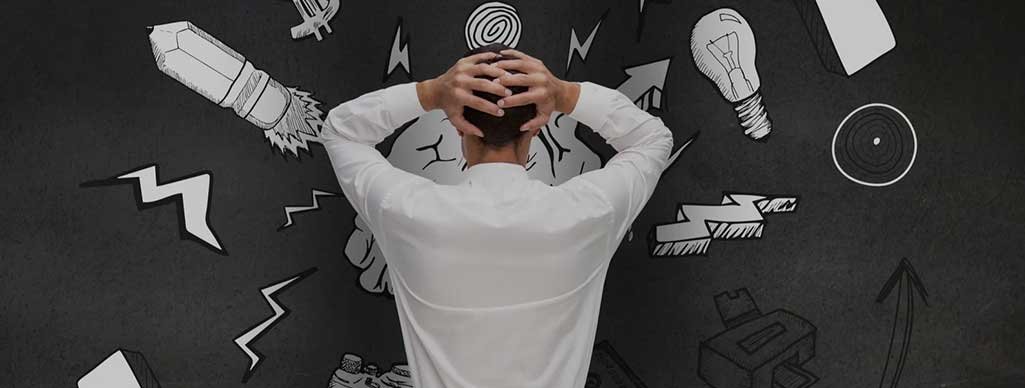
Dipdyuti Chowdhury, IOCL
dipdyuti@indianoil.in

Abstract
This article is taken from the case study of a successful corporate executive, who sought psychiatric assistance to overcome issues of anger management.
Main Content
The Perils of Success. (A case study)
Diwakar has everything going well for him. He has been recently promoted, and among his batch mates, he is an object of envy. The organization he works for has allotted a bigger accommodation to him, in view of his promotion, and he has just moved into spacious bungalow. His family is happy with the new arrangement where his daughter gets a study room all to herself.
A great feeling of gratitude engulfed Diwakar when he thought about his organization. He started working with a lot of zeal and involvement. He also got to spend quality time with his family by taking them out on trips and holidays, whenever time permits. At one point, Diwakar, a small-town boy, thought to himself – life cannot get any better than this.
One day, Diwakar came home with a headache and told his wife, “Please make a cup of strong coffee, I need it for this headache.” She gave him the beverage. After one sip from the cup, Diwakar lost his cool. He started shouting, “I asked for coffee and you gave me tea. What’s wrong with everything here, no one listens to me and things don’t move unless I shout”.
His wife quietly took the cup away and replaced it with a cup of coffee. Diwakar was too stressed and the tension in his home became palpable.
That night, Diwakar’s wife told him, “We need to discuss something and alone, and no mobiles please”. Diwakar was ready to say sorry to his wife for the incident in the evening and carry on, but his wife said, “I don’t want your apology. I understand you have work pressures. I have already forgiven you. The matter I want to discuss is more serious – You are not the same person I knew. You have changed. You are too stressed now-a-days and you need to address it yourself.” She was a much matured woman and she continued, “I have prepared dinner for you with your favourite dishes but just make one commitment to me – just accept that you are having a problem”.
Diwakar was in two minds – whether to argue with his wife, giving some explanation or to ruminate on her words. He took the second route. He said, “Give me some time to think”.
Next day, early in the morning, after he got home after a jog, he called his younger daughter and asked, “Darling, tell me the truth. Have I changed? Or am I still the father you loved to be with”. His daughter replied, “You are still the father I love and respect but your behaviour has undergone a marked change”.
That day after reaching office, Diwakar was a bit disturbed. He thought of his long struggles as a boy from a middle-class household to his current position as a senior executive of a huge company. He thought of his loving family and his extended family of friends and well-wishers. He decided to take his wife seriously because a few days back a friend had told him, “Why do you suddenly lose your temper. Learn to control your anger”.
Diwakar took an appointment with a psychologist and after office hours went to meet him. His wife is used to him coming home late from work, and hence there was no issue on the home front.
The first question the psychologist asked him after the initial introduction was, “Who brought you here”. Diwakar said, “Nobody knows, I came on my own”. The psychologist smiled and said, “In that case, my friend you are already half way home. The first step towards a cure is taken when the patient himself accepts he has a problem”.
The psychologist continued, “Today, We will not discuss your problems. We will discuss a topic that you like. You look like a sportsman. Can we discuss about sports and cricket because it’s also one of my favourite topics”. Diwakar agreed and both had a long and friendly talk about the game of cricket and the Indian Cricket team’s World Cup win in 1983.
When he took the psychologist’s leave after nearly one hour of discussion, the psychologist prescribed some medicines. He asked Diwakarto take them for one week and then meet him. Diwakar went home, and after having dinner with his family, took a tablet and had slept deeply that night.
Next day on a whim, he checked the details of the medicine on the internet and found that the psychologist had prescribed a medicine for anxiety, depression and bipolar disorder. Initially, he was furious at the psychologist for considering him mad, but after some time of ruminating, he decided to give this psychological treatment a genuine try.
It took six months of counselling and medicines for Diwakar to be the fine person he once was. Diwakar continued to be self-driven, hardworking, and above all, matured with a deeper view and understanding of life. He remained competitive like he was but with compassion and love for all.
I asked the psychologist, who is my friend, to explain how Diwakar was treated. The psychologist explained a few issues pertaining to the process and public misconceptions.
This is what he told me:
There is no personality that can be called “normal”. Normal is a word we casually use but no one is normal – everyone is unique and different. Everyone, in their walk of life, face external stimuli which is same for all, but how each person reacts to those stimuli decides what happens to them. Every person reacts differently to the same external environment.
In the case of Diwakar, he was internalising every incident. With a success story behind him, he set very high standards for himself and whenever something went wrong, he blamed himself internally. This caused stress within him. This stress created a vicious cycle – As the stress built up, he became less efficient. Less efficiency led to things going wrong adding up to the already existing stress and the cycle is repeated..
The psychological aspect of the “internalizing nature” of some people requires explanation. Say a newspaper headline announces the sudden collapse of a road over bridge with the death of a few people. Many people will read it, feel bad and move on. A few others will imagine how horrible the tragedy was. They will then imagine whether the bridge which they regularly cross is in a good condition or not. This negativity builds up and they start thinking about the consequences if the over bridge in their city collapses and the tragedy involves their family. This depressing thought results in the body releasing many stress hormones and unnecessarily the person gets a panic attack. Diwakar was internalising every stimuli of the environment.
I gave him the medicines to bring him from a state of extreme hypersensitivity to a more manageable level. Please understand, “only medicines” do not work, neither does “only counselling”. We have to decide on a judicious mix of both. The role of counselling is important but the use of medicines that lower the hyperactive state is also necessary. Prescribing medicine is again a risky proposition. It has to be under very controlled conditions. A high dosage of medicines will make him dull and addicted to the medicines. He might even suffer from withdrawal symptoms. So, these are to be strictly monitored by a competent psychologist.
Unlike many, I never advise my clients to go on a holiday or take a break. You have to go to the root of the issues and find solutions to them. Going on a holiday might temporarily give him some space, but it’s like curing a headache due to bad eyesight with an aspirin. The moment he returns to his work from the holiday, he will again start boiling over. Moreover, in this modern world, you cannot take a man away from his work, he will always remain connected to the issues of the office.
Many people during this phase of hyper stress take recourse to unethical love affairs. This is very bad. Maximum office romances happen because both the man and woman suffer from some unresolved issues and seek solace in a furtive friendship or an affair. These kinds of unethical love affairs result in more unreconciled issues and more mess in their lives. In Diwakar’s case, luckily nothing like that happened.
The fundamental fact is that I made Diwakar accept that in due course he needs to accept the world with its imperfections. So, when a junior does not deliver as per his expectations, instead of blaming himself and the junior, he should ruminate on how to ease the task for all. Anger is a strict no. The more you harangue your juniors, the more stressed you become and this results in more inefficiency. One psychologically deviant person can cause the same deviation in all the people around him. Diwakar’s wife is a matured lady and I really admire her calm and cool response to his frequent bouts of anger.
Look at a conductor who conducts a symphony orchestra. The joy of music is written large on his face as he directs the musicians to play their instruments. One or two musicians might make a mistake, but the conductor along with the team will move forward brushing aside the errors and inconsistency and create something that is divine, inspiring and beautiful. This is the spirit in which all creative efforts of humanity thrive. Office work is no less creative than a symphony orchestra. If you love life you will learn to love your work. Constant work that makes you happy is the greatest cure for all major health issues.
Finally, the art of forgiveness is something that needs to be imbibed. Hatred is an acid that corrodes the vessel which holds it. Diwakar’s success generated many foes and ego clashes developed on a day-to-day basis. This vicious ego clashes creates more inconsistencies and stress in his work life.
One day he complained to me about a colleague who is intentionally putting roadblocks in his path by raising random issues – small and meaningless. I told Diwakar, to be non reactive for some time. One day, I told Diwakar to call his rival for a cup of tea to his room and discuss anything but the office issues. Diwakar did that. Although friendship did not develop between the two, but the first ice breaking event happened.
Another day in a board meeting, his colleague brought in a list of errors in Diwakar’s work. Diwakar reacted very politely by saying, “Thank you so much for pointing out these errors. I will definitely make all efforts to rectify them. Had you but told me these things ten days back, maybe by now, I would have had the solutions to each of these issues. I also look forward to your help and guidance in solving them”.
Later on, during the discussion, when he got an opportunity to pick holes in his rival’s presentation, he did not do so openly but after the meeting, went to his rival’s room and quietly pointed out the errors, and helped him in rectifying them.
I told Diwakar, “The biggest challenge for you is to defeat the enmity and not the enemy.” With time, Diwakar stopped responding to each and every negative stimulus from his colleagues. This somewhat gave him an inner peace. His colleagues also stopped seeing him as a rival and more as a co-worker. In fact, many of the people who were jealous of his success started coming to him for suggestions and guidance.
You must have heard of the saying – failure is the pillar of success. The competitive modern society taught us how to deal with failure but not how to deal with success. Success is a very challenging event in a person’s life. The seeds of great failure lie within every success. It might be hard to climb to the top but to stay at the top is harder. You need to understand the deeper implications of any success in your life.
There is nothing called a successful life. The modern trend is to create a fake world of competition and adulation that goes on in a cyclical manner. Competition is good because it brings out the best. Competition is also very dangerous when the stakes are high. Even the stakes are nebulous and created by marketing hype.
A successful person is not one with a huge bank balance or great designation. A successful person is one who is internally in a state of equilibrium. A person with equanimity will always be ready with fortitude for the unexpected. They will realise that every day will throw new challenges, but they will also have faith in their own capabilities to overcome them. In the face of failure, they will rationally analyse and rectify behaviour. They will not probe too deeply on the implications but will move on.
Gautama Buddha said desire is the root of all sadness. However, without desire how will society grow? How will humanity thrive? Therefore, the challenge is to channelized desire into creative output.
Life is easy if you inculcate these habits.
Realistic optimism, persistence, creativity and above all self-discipline.
Regarding Diwakar, I think I will not see him again but there are two conditions that he might go through in the future. One is relapse into a state of hypersensitivity and suspicion or he might get totally disinterested in the normal things. In the second state, he will become completely listless and hence this state is worse of the two.
Posted in Case Studies | No Comments »
